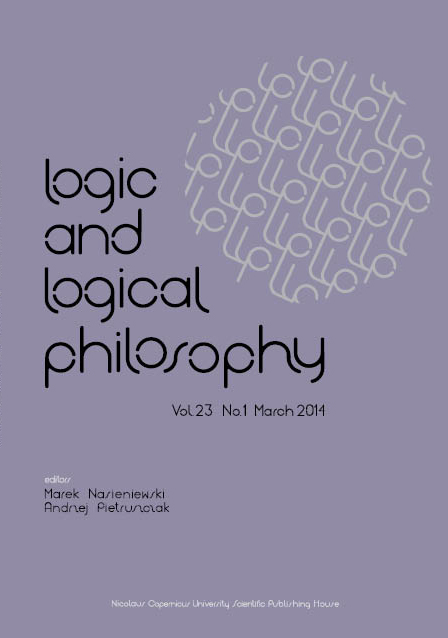Connecting bilattice theory with multivalued logic
DOI:
https://doi.org/10.12775/LLP.2013.036Keywords
bilattice, fuzzy logic, world-based semantics, approximate reasoningAbstract
This is an exploratory paper whose aim is to investigate the potentialities of bilattice theory for an adequate definition of the deduction apparatus for multi-valued logic. We argue that bilattice theory enables us to obtain a nice extension of the graded approach to fuzzy logic. To give an example, a completeness theorem for a logic based on Boolean algebras is proved.References
Biacino, L., and G. Gerla, “Generated necessities and possibilities”, International Journal of Intelligent Systems, 7 (1992): 445–454. DOI: 10.1002/int.4550070504
Carotenuto, G., and G. Gerla, “Fuzzy logic programming and bilattices”, International Journal of Approximate Reasoning, 54 (2013): 1066–1086.
Deschrijver, G., O. Arieli, C. Cornelis and E. Kerre, “A bilattice-based framework for handling graded truth and imprecision”, International Journal of Uncertainty, Fuzziness and Knowledge-Based Systems, 15 (2007), 1: 13–41. DOI: 10.1142/S0218488507004352
Dubois, D., “On ignorance and contradiction considered as truth-values”, Logic Journal of the IGPL, 16 (2008), 2: 195–216. DOI: 10.1093/jigpal/jzn003
Dubois, D., J. Lang and H. Prade, “Possibilistic logic”, pages 439–513 in Handbook of Logic in AI and Logic Programming, vol. 3, D.M. Gabbay, et al. (eds.), Oxford University Press, 1994.
Fitting, M., “Bilattices and the semantics of logic programming”, Journal of Logic Programming, 11 (1991): 91–116. DOI: 10.1016/0743-1066(91)90014-G
Fitting, M., “Fixedpoint semantics for logic programming: a survey”, Theoretical Computer Science, 278 (2002): 25–51.
Ginsberg, M., “Multivalued logics: a uniform approach to inference in artificial intelligence”, Computer Intelligence, 4 (1988): 265–316. DOI: 10.1111/j.1467-8640.1988.tb00280.x
Gerla, G., “Closure operators, fuzzy logic and constraints”, pages 101–120 in Fuzzy Sets, Logics and Reasoning About Knowledge, D. Dubois, H. Prade E.P. Klement (eds.), vol. 15, in the Applied Logic Series, Kluwer Connecting Bilattice theory with multivalued logic 31 Academic Publishers, 1999. DOI: 10.1007/978-94-017-1652-9_7
Gerla, G., “Inferences in probability logic”, Artificial Intelligence, 70 (1994): 33–52. DOI: 10.1016/0004-3702(94)90102-3
Gerla, G., “Probability-like functionals and fuzzy logic”, Journal of Mathematical Analysis and Applications, 216 (1997): 438–465.
Gerla, G., Fuzzy Logic: Mathematical Tools for Approximate Reasoning, Kluwer Academic Publishers, 2001.
Gerla, G., “Effectiveness and multivalued logics”, Journal of Symbolic Logic, 71 (2006): 137–162. DOI: 10.2178/jsl/1140641166
Goguen, J.A., “The logic of inexact concepts”, Synthese, 19 (1968/1969): 325–373. DOI: 10.1007/BF00485654
Gottwald, S., Fuzzy Sets and Fuzzy Logic, Vieweg, Wiesbaden, 1993.
Hájek, P., Metamathematics of Fuzzy Logic, Kluwer Academic Publishers, Dordrecht, 1998.
Nikolov, N.G., “Deductive properties of intuitionistic fuzzy logic”, Fifth Int. Conf. on IFSs NIFS, 7 (2001), 3: 43–48.
Novak, V., Fuzzy Sets and their Applications, Adam Hilger, Bristol, 1989.
Pavelka, J., “On fuzzy logic I: Many-valued rules of inference”, Zeitschrift für Mathematische Logik und Grundlagen der Mathematik, 25 (1979): 45–52. DOI: 10.1002/malq.19790250304
Pilitowska, A., “Interval bilatticesand some other simple bilattices”, pages 190–196 in Relational Methods in Computer Science, H.C.M. de Swart (ed.), vol. 2561 in Lecture Notes in Computer Science, Springer-Verlag, Berlin Heidelberg 2002. DOI: 10.1007/3-540-36280-0_13
Scarpellini, B., “Die Nichaxiomatisierbarkeit des unendlichwertigen Prädikatenkalküls von Łukasiewicz”, Journal of Symbolic Logic, 27 (1962): 159–170. DOI: 10.2307/2964111
Turunen, E., M. Öztürk and A. Tsoukiás, “Paraconsistent semantics for Pavelka style fuzzy sentential logic”, Fuzzy Sets and Systems, 161 (2010): 1926–1940. DOI: 10.1016/j.fss.2009.12.017
Zadeh, L.A., “Fuzzy sets”, Information and Control, 8 (1965): 338–353.
Downloads
Published
How to Cite
Issue
Section
Stats
Number of views and downloads: 690
Number of citations: 4







